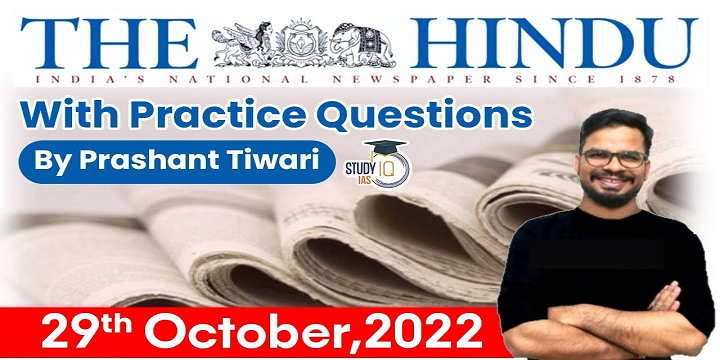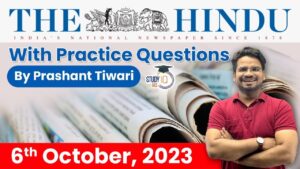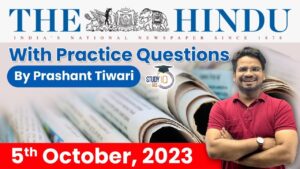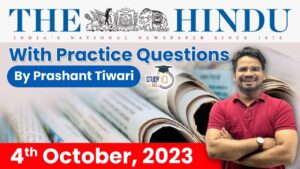The Hindu Newspaper Analysis for UPSC
- Prime Minister Narendra Modi on Friday said that Central laws such as the Unlawful Activities (Prevention) Act (UAPA) had given an impetus to the system in a decisive fight against terrorism.
- The Prime Minister said the police should be equipped to face not only those Naxals who hold a gun but also those who wield a pen and mislead the youth by exploiting their emotions. Such forces who get “international support” should not be allowed to take root as they were detrimental to the unity and integrity of the country, he said.
- Modi’s statement on the anti-terror legislation UAPA comes at a time when the Supreme Court is examining a petition that has challenged the validity of the law.
UAPA Law
- Originally enacted in 1967, the UAPA was amended to be modelled as an anti-terror law in 2004 and 2008.
- In August 2019, Parliament cleared the Unlawful Activities (Prevention) Amendment Bill, 2019 to designate individuals as terrorists on certain grounds provided in the Act.
- In order to deal with the terrorism related crimes, it deviates from ordinary legal procedures and creates an exceptional regime where constitutional safeguards of the accused are curtailed.
- Between 2016 and 2019, the period for which UAPA figures have been published by the National Crime Records Bureau (NCRB), a total of 4,231 FIRs were filed under various sections of the UAPA, of which 112 cases have resulted in convictions.
Associated Issues
- Vague Definition of Terrorist Act: The definition of a “terrorist act” under the UAPA substantially differs from the definition promoted by the United Nations (UN) Special Rapporteur on the Protection of Human Rights and Fundamental Freedoms while Countering Terrorism.
- Denial of Bail: The major problem with the UAPA lies in its Section 43(D)(5), which prevents the release of any accused person on bail if, police have filed the chargesheet that there are reasonable grounds for believing that the accusation against such person is prima facie true.
- The focus here is on reframing ‘Framing Guidelines Regarding Potential Mitigating Circumstances to be Considered While Imposing Death Sentences’, a decision authored by the three judge Bench (the current CJI and Justices Ravindra Bhat and Sudhanshu Dhulia, September 19, 2022).
- Manoj and Ors. vs State of M.P., said: “trial court must take into account the social milieu, the educational levels, whether the accused had faced trauma earlier in life, family circumstances, psychological evaluation of a convict and post-conviction conduct, were relevant factors at the time of considering whether the death penalty ought to be imposed upon the accused”.
- In 1980, the Supreme Court upheld the constitutionality of capital punishment in ‘Bachan Singh v State of Punjab’ on the condition that the punishment will be awarded in the “rarest of the rare” cases.
- India and other developing economies are justifiably worried about the damage to growth from COVID-19, Russia’s war in Ukraine, and the global economy’s downturn.
- That is why it is imperative that COP27 — the United Nations’ climate summit which opens in Egypt from November 6 — makes real advances to stave off the worst effects of global warming.
- This means going beyond COP21’s important Paris agreement (2015) on national commitments to cut GHG emissions and COP26’s notable Glasgow agreement (2021) to stem deforestation.
- Just as problematic is the continuous and heavy burning of fossil fuels by the top five emitters — China, the United States, India, Russia, and Japan — as well as Southeast Asian countries taken together
- when it comes to climate change, rich countries are failing dismally in raising the UN-goal of at least $100 billion annually in climate finance for developing countries.
- Ahead of COP27, Singapore has announced that it will achieve net zero emissions by 2050, a powerful signal even if coming from a country with only 0.1% of the carbon footprint.
- India’s reliance on fossil fuels is extremely high. High GDP growth, India’s biggest goal, just cannot be achieved in the face of runaway climate change. The country has set a target date of 2070 for net zero.
- China is the world’s leader in renewable energy, but its share of coal and gas in energy production remains over 70%, with the country continuing to finance massive fossil fuel-based infrastructure. China has announced net zero for 2060.
Where did it Originate?
- The United Nations Framework Convention on Climate Change (UNFCCC), signed in 1992 at the United Nations Conference on Environment and Development also known as the Earth Summit, the Rio Summit or the Rio Conference
- The UNFCCC entered into force on March 21, 1994.
- The Convention has near universal membership (197 Parties) and is the parent treaty of the 2015 Paris Agreement.
- The original secretariat was in Geneva. Since 1996, the secretariat has been located in Bonn, Germany.
- Article 7.2 defines the COP as the “supreme body” of the Convention, as it is its highest decision-making authority. The climate change process revolves around the annual sessions of the COP.
Constitutional Provisions:
Disqualifications under the Constitution, a person shall be disqualified for being chosen as and for being a member of the legislative assembly or legislative council of a state:
- If he/she holds any office of profit under the Union or state government (except that of a minister or any other office exempted by state legislature),
- If he/she is of unsound mind and stands so declared by a court,
- If he/she is an undischarged insolvent,
- If he/she is not a citizen of India or has voluntarily acquired the citizenship of a foreign state or is under any acknowledgement of allegiance to a foreign state, and
- If he/she is so disqualified under any law made by Parliament.
Apart from these, the Parliament has prescribed several additional disqualifications in the Representation of People Act (1951). These include,
- He/she must not have been found guilty of certain election offences or corrupt practices in the elections.
- He/she must not have been convicted for any offence resulting in imprisonment for two or more years. But, the detention of a person under a preventive detention law is not a disqualification.
- He/she must not have failed to lodge an account of his election expenses within the time.
- He/she must not have any interest in government contracts, works, or services.
- He/she must not have been dismissed from government service for corruption or disloyalty to the state.
Lily Thomas vs Union of India 2013 – Case Scenario
- The Supreme court of India, in its judgement dated 10 july 2013 while disposing the Lily Thomas vs union of India ( along with Lok prahari vs UoI ) ruled that any MP, MLA, or MLC who is convicted of a crime and sentenced to a minimum of two years in jail loses their membership in the house immediately.
- In Lily Thomas v. Union of India (2013), the Supreme Court declared Section 8(4) of the Representation of the People Act 1951 invalid, which gave convicted legislators a three-month period to appeal to a higher court and gain a stay on their conviction and sentence.
- This has impacted nearly 5000 elected officials. According to the ruling, all elected and non-elected MPs and MLAs will be disqualified with immediate effect.
- India’s TB incidence for the year 2021 is 210 per 100,000 population – compared to the baseline year of 2015 (incidence was 256 per lakh population in India) and there has been an 18% decline which is 7 percentage points better than the global average of 11%, said the Health Ministry on Friday, while reacting to the World Health Organization (WHO) Global TB Report 2022, released on October 27.
- According to the WHO report, an estimated 10.6 million people fell ill with tuberculosis (TB) in 2021, an increase of 4.5% from 2020, and 1.6 million people died from TB (including 187 000 among HIV positive people).
- bout: Tuberculosis (TB) is an infectious disease caused by Mycobacterium tuberculosis.
- It commonly affects the lungs, but can also affect other parts of the body.
- It is a treatable and curable disease.
- Transmission: TB is spread from person to person through the air. When people with lung TB cough, sneeze or spit, they propel the TB germs into the air.
- Symptoms: Common symptoms of active lung TB are cough with sputum and blood at times, chest pains, weakness, weight loss, fever and night sweats.
- Vaccine: Bacille Calmette-Guérin (BCG) is a vaccine for TB disease.
What Pradhan Mantri TB Mukt Bharat Abhiyan?
- About:
- It’s an initiative of Ministery of Health and Family Welfare (MOHFW) to accelerate the country’s progress towards TB elimination by 2025.
- Objectives:
- Provide additional patient support to improve treatment outcomes of TB patients
- Augment community involvement in meeting India’s commitment to end TB by 2025.
- Leverage Corporate Social Responsibility (CSR) activities.
Components:
- Ni-kshay Mitra Initiative: It is to ensure additional diagnostic, nutritional, and vocational support to those on TB treatment.
- Ni-kshay Mitra (Donor) are those who can support by adopting health facilities (for individual donor), blocks/urban wards/districts/states for accelerating response against TB to complement government efforts.
- Ni-kshay Digital Portal: It will provide a platform for community support for persons with TB.
- Prime Minister Narendra Modi on Friday mooted the idea of ‘one nation, one police uniform’. He was addressing the State Home Ministers’ conference on internal security issues in Faridabad, Haryana.
- Modi said he was not imposing his views on States, but it was an idea worth deliberating on. He said police uniforms should have a brand recall just like the red-and-black post boxes in the country.
- “On the lines of ‘one nation, one ration card’; ‘one nation, one mobility card’; ‘one nation, one sign language’, we should think of ‘one nation, one police uniform’. This will benefit the police personnel as quality product will be available. The production of belts, caps and uniform will be on a mass scale,” he said.
Q) India is a member of which of the following constituents of the World Bank Group?
- International Bank for Reconstruction and Development (IBRD)
- International Centre for Settlement of Investment Disputes (ICSID)
- International Development Association (IDA)
- Multilateral Investment Guarantee Agency (MIGA)
Select the correct answer code:
- 1, 2, 3
- 1, 3, 4
- 2, 3, 4
- 1, 2, 3, 4
भारत विश्व बैंक समूह के निम्नलिखित में से किस घटक का सदस्य है?
- पुनर्निर्माण और विकास के लिए अंतर्राष्ट्रीय बैंक (IBRD)
- निवेश विवादों के निपटान के लिए अंतर्राष्ट्रीय केंद्र (ICSID)
- अंतर्राष्ट्रीय विकास संघ (आईडीए)
- बहुपक्षीय निवेश गारंटी एजेंसी (MIGA)
सही उत्तर कोड चुनें:
- 1, 2, 3
- 1, 3, 4
- 2, 3, 4
- 1, 2, 3, 4
- India is a member of four of the five constituents of the World Bank Group viz., International Bank for Reconstruction and Development (IBRD), International Development Association (IDA), International Finance Corporation (IFC) and Multilateral Investment Guarantee Agency (MIGA). India is not a member of ICSID (International Centre for Settlement of Investment Disputes). India has been accessing funds from the World Bank (mainly through IBRD and IDA) for various development projects.
Q) The state of Eritrea is bordered by
- Sudan
- Ethiopia
- Djibouti
Select the correct answer using the code below:
- 1 and 2 only
- 2 and 3 only
- 1 and 3 only
- 1, 2 and 3
इरिट्रिया राज्य की सीमा से लगती है
- सूडान
- इथियोपिया
- जिबूती
नीचे दिए गए कूट का प्रयोग कर सही उत्तर चुनिए:
- केवल 1 और 2
- केवल 2 और 3
- केवल 1 और 3
- 1, 2 और 3
Explanation:
- The state of Eritrea is bordered by Sudan in west, by Ethiopia in south and by Djibouti in south east.
- The country shares also maritime borders with Saudi Arabia and Yemen. The former Italian colony became part of a federation with Ethiopia in 1947, in 1952 Eritrea was annexed by Ethiopia.
Q) With reference to the National Investigation Agency (NIA), consider the following statements:
- It was created after the 2008 Mumbai terror attacks with the enactment of the National Investigation Agency Act 2008.
- It is headquartered in Mumbai.
Which of the above statements is/are correct?
- 1 only
- 2 only
- Both 1 and 2
- Neither 1 nor 2
राष्ट्रीय जांच एजेंसी (एनआईए) के संदर्भ में, निम्नलिखित कथनों पर विचार करें:
- इसे 2008 के मुंबई आतंकी हमलों के बाद राष्ट्रीय जांच एजेंसी अधिनियम 2008 के अधिनियमन के साथ बनाया गया था।
- इसका मुख्यालय मुंबई में है।
उपरोक्त में से कौन सा/से कथन सही है/हैं?
- केवल 1
- केवल 2
- दोनों 1 और 2
- न तो 1 और न ही 2
Explanation :
Union Home and Cooperation Minister recently said that National Investigation Agency (NIA) agency to have offices in all states by 2024.
- National Investigation Agency (NIA) is the Central Counter Terrorism Law Enforcement Agency of India.
- Parent agency: Union Ministry of Home Affairs.
- Establishment: NIA was created after the 2008 Mumbai terror attacks with the enactment of the National Investigation Agency Act 2008.
- Jurisdiction:
- The agency is empowered to deal with terror related crimes across states without special permission from the states.
- A State Government may request the Central Government to hand over the investigation of a case to the NIA, provided the case has been registered for the offences as contained in the schedule to the NIA Act.
- Offices:
- It is headquartered in Delhi.
- Branches: Hyderabad, Guwahati, Kochi, Lucknow, Mumbai, Kolkata, Raipur, Jammu, Chandigarh, Ranchi, Chennai and Imphal.
Q) Gurdwara Panja Sahib is located in:
- Pakistan
- India
- Nepal
- Bhutan
गुरुद्वारा पंजा साहिब स्थित है:
- पाकिस्तान
- भारत
- नेपाल
- भूटान
Gurdwara Panja Sahib:
- The history of the shrine Gurdwara Panja Sahib, in Hasan Abdal of Pakistan, is far older than the Saka Panja Sahib incident.
- The gurdwara was built on the site believed to be visited by Sikhism’s founder Guru Nanak Dev, along with his companion Bhai Mardana.
Q) Bestu Varsh is widely celebrated in which of the following state?
- Gujarat
- Odisha
- West Bengal
- Assam
बेस्टु वर्ष व्यापक रूप से निम्नलिखित में से किस राज्य में मनाया जाता है?
- गुजरात
- ओडिशा
- पश्चिम बंगाल
- असम
Explanation :
Gujarati New Year or Bestu Varsh is being celebrated on October 26, 2022
- In Gujarat, the New Year which is popularly known as Bestu Varsh is celebrated as part of the five-day Diwali Celebrations.
- Ideally, Gujarati New Year falls on Pratipada of Shukla Paksha in the Kartik month; therefore, it is generally celebrated on Govardhan Puja during Diwali.
- People begin their New Year by visiting temples in the morning.
- Homes are decorated with Asopalav torans and marigold flowers, and attractive Rangoli at the entrance to welcome guests on the New Year.
Mains Practice Question:
Q) Why Prohibition of liquor is not the ideal solution to check overuse of alcohol ? (150 words)
शराब के अति प्रयोग को रोकने के लिए शराब का निषेध आदर्श समाधान क्यों नहीं है? (150 शब्द)


 The Hindu Newspaper Analysis 6 October 2...
The Hindu Newspaper Analysis 6 October 2...
 The Hindu Newspaper Analysis 5 October 2...
The Hindu Newspaper Analysis 5 October 2...
 The Hindu Newspaper Analysis 4 October 2...
The Hindu Newspaper Analysis 4 October 2...





















